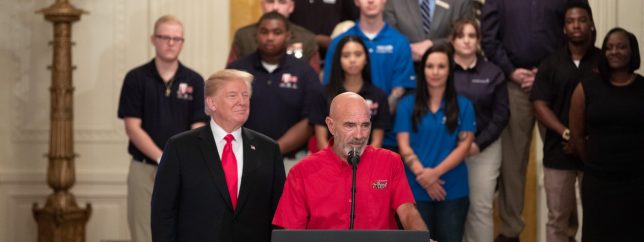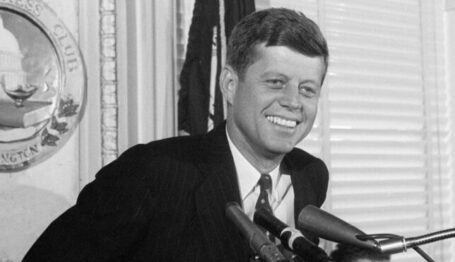Labor Watch
Litigious Labor in the White House: Limiting Labor’s Sway


Litigious Labor in the White House (complete series)
The National Treasury Employees Union | Partisan Players | Limiting Labor’s Sway
Summary: Banking millions of dollars in pay raises and bonuses for its members? Check. Corrupt officials charged with fraud and embezzlement? Check. Donations to the Democratic Party? Check. The National Treasury Employees Union has it all. But some say that the union played a key role in the IRS’s scheme to target Tea Party groups ahead of Barack Obama’s 2012 reelection campaign.
De-Unionizing the IRS?
While the NTEU is hardly the biggest spender among labor unions—in 2016, AFSCME gave $1.6 million to Democrats and the Laborers’ International Union of North America (LIUNA) spent $1.3 million—Congressional Republicans have made rolling back its influence over the IRS a goal.
In June, the U.S. Supreme Court ruled in Janus v. AFSCME that public sector workers cannot be obligated to join a labor union, dealing a serious blow to public sector labor unions. Although the NTEU was already prohibited by law from forcing federal employees to join its ranks, the Janus decision signaled a major defeat for Big Labor. Following on the heels of the Court’s decision, Rep. Paul Gosar (R-Arizona) introduced the “Preventing Unionization of Revenue Service Employees (PURSE) Act” (H.R. 6268) in July. The bill (still in committee as of this writing) would take the government’s de facto right to work status even further by excluding “employees of the Internal Revenue Service from provisions of federal personnel law allowing federal employees to organize, bargain collectively, and participate in labor organizations.”
“Millions of [taxpayers’] dollars have been wasted by IRS employees who have spent their work days on union activities,” wrote Gosar’s office, “rather than their official duties.” How much money—$22 million in salary and benefits in 2016 alone, amounting to 482,000 hours on “official time,” according to the website GovExec.com.
“Official time” is a legal practice established in 1978 enabling federal workers to conduct union representational activity such as membership solicitation during regular work hours, usually limited by individual agencies through collective bargaining agreements. Collecting dues and advocating the election of candidates for public office is strictly prohibited.
Americans for Tax Reform, headed by tax hawk Grover Norquist, endorsed the bill, writing:
Currently, other federal agencies such as the FBI, GAO [Government Accountability Office] and the NSA [National Security Agency], are prohibited from unionizing and entering into collective bargaining agreements. There is no reason why the IRS should not be prohibited from doing the same.
. . . with over 70,000 union-covered IRS employees, and 95% of union contributions going to Democrat candidates, it is clear that there is a massive infiltration of partisan politics in our supposedly nonpartisan agencies.
This isn’t the first time House Republicans have criticized the IRS for doing the NTEU’s business on the clock. In September 2014, House Ways and Means Committee chair Charles Boustany (R-Louisiana) criticized the agency for one employee in Washington, D.C., then earning a GS-14 salary (ranging from roughly $106,000 to $138,000 annually) without performing any IRS duties. The employee, according to Boustany, was effectively a taxpayer-funded activist for NTEU—spending all of his or her time representing the union “at a time when the IRS claims it is unable to perform required duties as a result of it being understaffed and underfunded.”
Curiously, Boustany was aided in his efforts by an email to the Ways and Means Committee from then-IRS Exempt Organizations director Lois Lerner, who reportedly “lament[ed] her powerlessness to terminate the employee.” Lerner was apparently frustrated that she could not fire the employee, writing that “we can’t do anything.” However, despite suggestions by colleagues that the employee be fired, Lerner merely “lowered the employee’s performance rating in order to avoid conflict with NTEU.”
In April 2015, the Committee released a scathing report criticizing the IRS’s “’abysmal’ customer service” and misallocation of resources, castigating the agency for calling Congressional budget cuts “a tax cut for tax cheats” while simultaneously continuing to allow employees to “spend hundreds of thousands of hours conducting union activities while at work.” In fiscal year 2014, according to the report, IRS employees spent an incredible 491,948 working hours performing union activities, with an astounding 36 agents devoting 50 percent or more of their time to NTEU work.
The NTEU, unsurprisingly, wasn’t pleased. Union president Tony Reardon called the PURSE Act “just another effort to deny working men and women basic rights in the workplace,” arguing that “what the IRS really needs is more staff and resources to better serve the American public.”
Limiting “Official Time”
On May 25, 2018, President Donald Trump signed an executive order “ensuring transparency, accountability, and efficiency in taxpayer-funded union time use” aimed at limiting abuse of official time. “Federal employees should spend the clear majority of their duty hours working for the public,” according to the order, which stipulated that federal employees “may not engage in lobbying activities during paid time” and capping official time at 25 percent of the employee’s work hours. Employees who fail performance standards should be easier to fire, particularly during periods of budget cuts when agencies must choose between laying off union-backed tenured staff or more recent hires, forcing bureaucracies to take job performance into account. The order was followed by two others intended to accomplish similar goals.
In June, the orders were attacked in a letter signed by 24 House Democrats, who accused them of “mark[ing] the end to meaningful contract bargaining in the federal government.” The letter was followed by a series of lawsuits by more than a dozen unions—headed by the AFL-CIO, AFGE, National Federation of Federal Employees, AFSCME, and NTEU—challenging the executive orders in a District of Columbia federal court on the grounds that they “impinge upon the constitutional rights of federal employees.”
On August 24, Judge Ketanji Brown Jackson (an Obama appointee briefly considered for Antonin Scalia’s Supreme Court seat) ruled against parts of the order mitigating official time as a violation of the government’s separation of powers under the U.S. Constitution, which NTEU hailed as an “historic victory.”
“Congress undertook to guarantee federal employees the statutory right to engage in good-faith collective bargaining,” Jackson wrote, a right which “safeguards the public interest. . . . And because many of the executive order provisions that the unions challenge here have that effect, this court concludes that the President has overstepped his bounds.” As of September, it remains unclear whether the White House will push back against the ruling.
NTEU in the Future
So where does that leave the NTEU today?
We may never know for sure what role the union played in covering up or assisting in the scheme to unfairly scrutinize Tea Party groups. But the Trump administration has taken steps which will hopefully roll back the NTEU’s power over the IRS, beginning with the dissolution of the National Council on Federal Labor-Management Relations in 2017. If nothing else, having a conservative president occupying the Oval Office should do wonders to limit the power the NTEU enjoyed in the Obama administration.
In the era following the Supreme Court’s Janus decision, NTEU seems likely to face greater scrutiny and less bargaining power as the power and membership in public sector labor unions ebbs. What that means for NTEU’s salary and bonus negotiating power is an open question. But promoting freedom of choice and the right to work is a blessing for federal employees and taxpayers alike.



